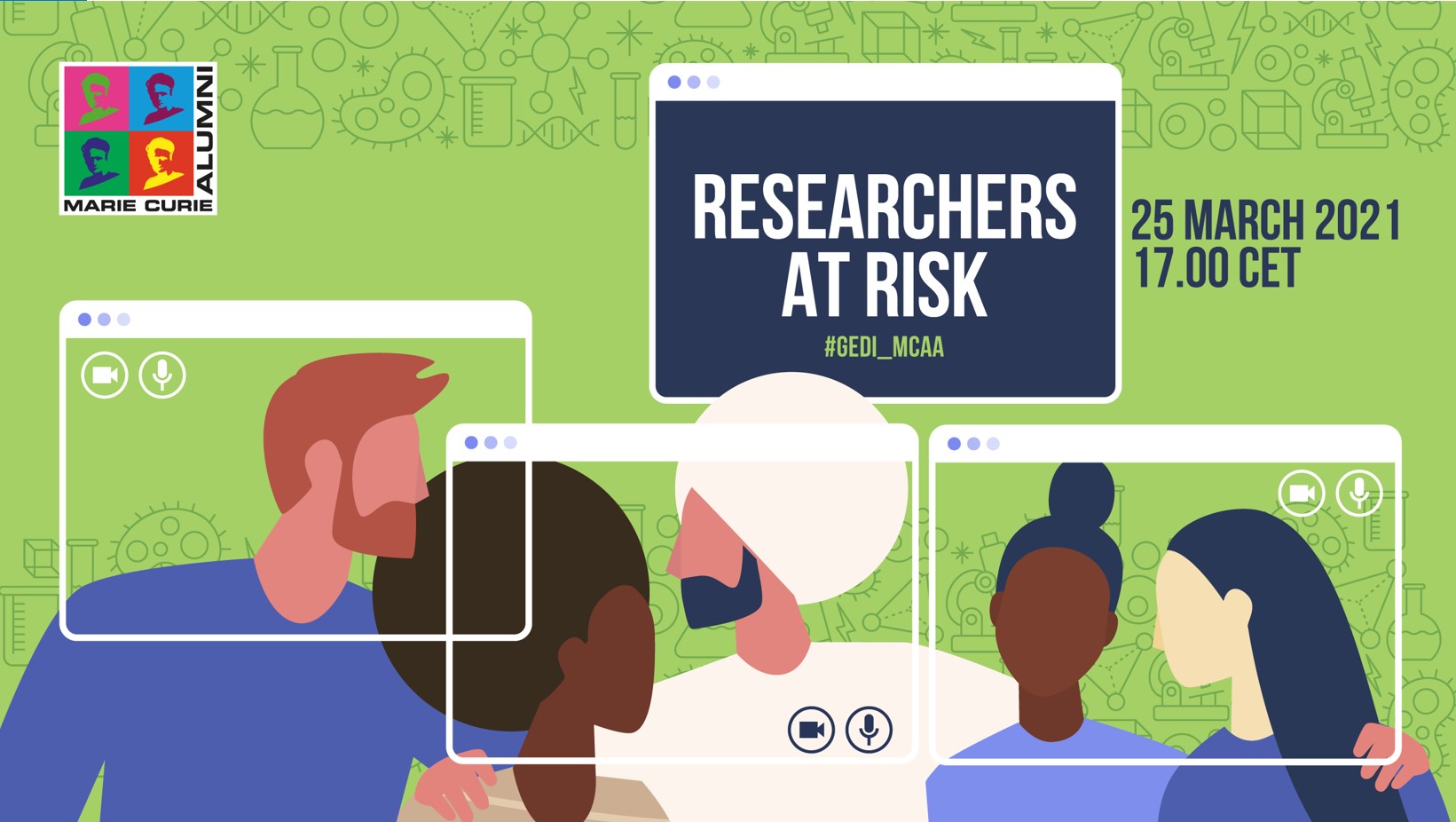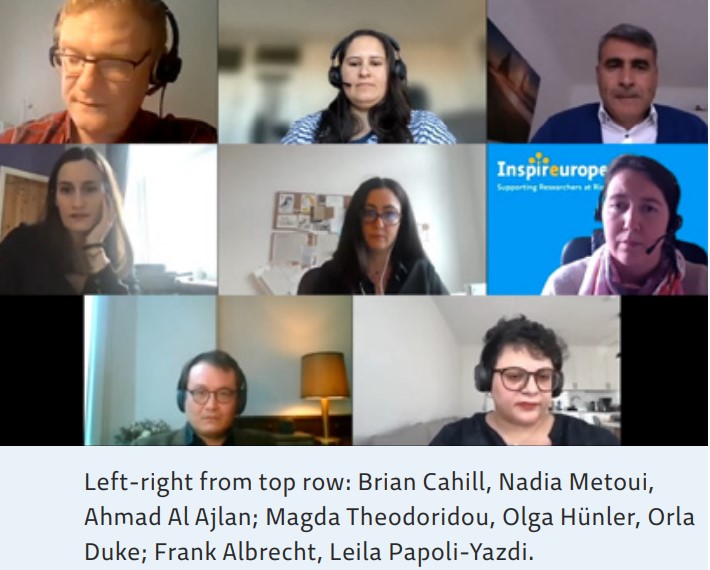News from the MCAA - Researchers at risk
Newsletter
Research is the pursuit of truth, it’s about observing, understanding, and challenging the established status quo. It requires asking the hard questions and delivering the unsettling answers. And it is about striving for change. Research requires passion, determination, bravery, resilience. Above all, it requires freedom. Many regions of the world are plagued by political crises or suffer from restricted personal freedoms, freedom of speech, and academic freedom. In these regions, researchers and scholars live in social, economic and political climates that put their careers, livelihood and lives in danger. These category of researchers are referred to as researchers or scholars at risk.
Many researchers and scholars at risk are pushed to seek refuge in more stable areas and countries where it seems possible to continue carrying out their academic and research activities and achieve the careers they aspire for. Researchers at risk have the potential to bring valuable skills and knowledge to the host country and the host institutions. However, many hurdles stand in the path of those researches before and while they reach their host countries and institutions.

On the 25th of March 2021 the MCAA Genders, Equity, Diversity and Inclusion Working Group (GEDI WG) organized a webinar on “Researchers at Risk: The Journey, Challenges & Opportunities.” The webinar was organised and facilitated by Nadia Metoui and Magda Theodoridou and moderated by Brian Cahill. The panel of speakers includedAhmad Al Ajlan (Post-doctoral researcher at the Institute for Interdisciplinary Conflict and Violence Research Bielefeld University, Germany), Olga Hünler (Visiting Researcher at the Freie Universität Berlin, Germany), and Leila Papoli-Yazdi (researcher at the Department of Cultural Sciences, Linnaeus University, Sweden); three researchers at risk who shared with us testimonies about the circumstances compelling them to leave their respective countries (Syria, Turkey, and Iran), as well as the difficulties they faced (and are still facing) in Europe. Frank Albrecht (Programme Director of the Philipp Schwartz Initiative, Alexander von Humboldt Foundation, Germany) and Orla Duke (Programme Manager for Scholars at Risk (SAR) Europe, Ireland) also accepted the invitation of GEDI and shared the background and details of these two programs (the Philipp Schwartz Initiative and SAR Europe) that aims to attract, support and empower scholars at risk. In the following sections, we will summarize the key ideas discussed during the webinar.
Trauma and mental health challenges
First, researchers and scholars at risk often suffer trauma and live in extremely stressful and mentally challenging conditions. Many of them fled conflicts, wars, and other deeply traumatising events. “Free to Think 20201 reported 341 cases of attacks against scholars in 58 countries in 2020, including 124 violent attacks and 96 wrongful imprisonments,” highlighted Orla. Several other incidents were reported by Ahmad, Leila, and Olga, including their own stories (e.g., massive firing of scholars, public defamation and vilification, passport confiscation and long imprisonment, and death sentences).

The tense and stressful conditions are exacerbated, at least at first, after leaving their countries. Many researchers have to go through complicated and draining procedures in a new country operating in a different language. Besides, not all scholars at risk are refugees, but many of them are, and in that case, they have to go through even more complex asylum procedures. They live long periods of instability and uncertainty. Some of them have left families and loved ones in their home countries, just to give some examples. Building a new life under these circumstances can be very challenging “if you are a person over 35 or 40, in some cases even over 50, it’s difficult to establish a new life in a new country again,” said Ahmad.

The panellists agreed that the most urgent aspect to address is providing mental and psychological support: “we’ve learned that one of the major topics for many scholars is overcoming trauma. Obtaining psychosocial support for themselves and their families is sometimes more important than anything else,” said Frank. The Philipp Schwartz grants dedicate 20,000 EUR as auxiliary funds to support fellows in different aspects including psychosocial support. “Violence does not only threaten your job or make you unemployed, but it also impacts your mental health and your personal life,” declared Leila. She advises all scholars at risk to pay particular attention to their mental health and to seek professional help as soon as they can. She also advises having a “lawyer or legal advisor” to help with the long and tedious procedures.
The academic job market: Shortage in opportunities and competitiveness
Beyond mental, personal, and familial struggles scholars at risk have to cope with a very competitive and demanding academic job market. Very few programs and fellowships are specifically dedicated to scholars at risk. Standard research grants (e.g., ERC, MSCA) have requirements and evaluation criteria that cannot and should not be applied to evaluate the scientific worth of a scholar at risk. Scholars at risk often live through long periods of unemployment where their research and academic work is interrupted. “You lose opportunities to read or update your knowledge in your field […] you lose the opportunity to build a network […] it is very hard to connect to a new work environment in a different country,” highlighted Leila.
Besides, “not all academics who are displaced or at risk have international experience,” explained Frank. Rules and criteria of excellence could have been very different in their home countries as confirmed by Ahmad “here (in Germany) there are very different methods when you write, teach, supervise the student, here you have to write grants.”
The speakers also agreed on the fact that academic entrepreneurship is also more ingrained in the European research culture. “If you have a research project, you have a position at the university. Then if you don’t have a research project, you’re out,” added Ahmad. “In countries like Sweden, […] you have to apply (for funding). It’s very hard and problematic for the researchers who have been doing their research for years and decades in Sweden. For the newcomer (scholars at risk), it’s simply too hard,” explained Leila.
Furthermore, existing initiatives and programs for scholars at risk, although very valuable, are often very competitive and offer shortterm contracts, which mirrors the precarious conditions of working in academia in general. This is especially heavy on scholars at risk because they often have mobility issues (e.g., asylum restrictions, visa procedures), sometimes financial issues etc., which lowers the motivation and leads to feelings of uncertainty, fatigue, and anxiety, as expressed by the speakers. After completing their fellowships, scholars at risk are encouraged to look for positions also outside academia; “it’s unlikely that all scholars that we can support will actually be able to remain in academia” explained Frank and even then “we have to be aware that follow-up positions are not necessarily long-term. They are frequently precarious, temporary positions. Just to paint a realistic picture.” he added.
Existing programs and actions supporting scholars at risk
Some initiatives and programs dedicated to hosting and supporting scholars at risk exist in Europe, for example the SAR network,2 which hosts threatened scholars for temporary academic visits. The Network established in Ireland includes, to date, over 540 institutions in 40 countries inside Europe and beyond. “SAR Europe aims also at strengthening the collective voice and contributing to informing the policymaking at EU level and to bridge the gaps between national and European support mechanisms,” as described by Orla. A second program mentioned in the webinar was the Phillip Schwartz-Initiative:3 AvH fellowship, “a fullyfunded two-year research fellowship that can be extended by a year,” explained Frank. The program supports scholars at risk through all the stages from the “rescue” phase to finding follow-up positions after completing the program.
Besides these programs, preventive actions and measures must be taken. According to Olga “academic freedom is something fragile. It should be promoted and protected actively, not just waiting for a miracle protecting it.” She engaged in several activist actions such as leading a massive open online course titled: “Dangerous questions. Why does academic freedom matters.”
What more should be done
To conclude the webinar speakers were asked what further actions they would like to see materialise in the near future. For Leila, one of the priorities should be to design better and more flexible evaluation criteria for programs targeting scholars at risk. These criteria should take into consideration: the periods of forced unemployment, types of publications, and scientific outputs that can be of different types or written in the scholar’s native language, to give some examples. For Olga one of the priorities is to safeguard academic freedom in Europe as well: “recent developments in Britain were very scary.
Appointing free speech champions to monitor the content of the academic discussion is unacceptable.” she explained. She also highlighted the importance of providing free space to academics to decide and develop their programs and shelter them from political and economic interests. In Ahmad’s opinion, the priority should first be working towards alleviating mobility restrictions for scholars with refugee backgrounds, if they can look for positions in other EU countries this will help them find a job faster but also work on projects they like. Second, he urged for better communication and coordination to inform the refugee scholar about different opportunities at the early-stage as soon as they register an asylum request in a given country. When asked the same question Frank answered “to be honest, the wish list is quite long” but if he has to pick one he would urge for EU level actions instigated by the European Commission. For instance developing researchers at risk scholarships, where the scholar has the possibility and flexibility to choose their host institutions/ countries “if you’re displaced by force, you can at least pick within the European Union where you’d like to go. I think that’s maybe a major part of a wish list.” said Frank.
Finally “Not at risk researchers’ colleagues can help scholars at risk by raising awareness” explained Brian, and by providing a platform for scholars at risk to share their experiences and testimonies, which was one of the principal aims of GEDI in organising this webinar.
1. https://www.scholarsatrisk.org/resources/free-to-think-2020/
2. https://www.scholarsatrisk.org/
3. https://www.humboldt-foundation.de/en/apply/sponsorship-programmes/philipp-schwartz-initiative
Nadia Metoui, Magda Theodoridou and Christina Makoundou
GEDI Working Group
gedi@mariecuriealumni.eu